If you want your dream lawn to look attractive and healthy, you are most likely to choose fresh grass seeds. But let’s say, for whatever reason, you were not able to seed your lawn for a couple of months. What can happen if you try to plant them?
Does grass seed expire? Grass seed does expire just like most of the other natural products. The expiration date is usually specified at the back of their packaging. However, this is an estimated date only, and the actual expiration date depends on the type of seeds and their storage conditions.
But what should you do if you find a bag of old seeds in your garage that you have been keeping for a long time? Will you just throw them away or still plant them? What are the chances that expired grass seeds will still grow?
How Long Is the Shelf Life of a Grass Seed?
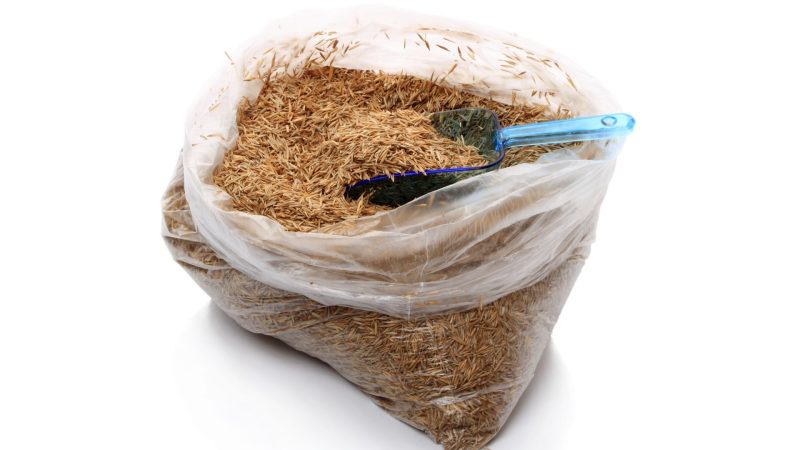
According to seed company Scotts, the shelf life of grass seed is 2 – 3 years if stored in a cool, dry place and safe from pests. However, they can lose their viability over time. Younger grass seeds have a higher germination rate, which means that the number of seeds that will grow is higher than those that will not.
Do Expired Seeds Still Grow?
Expired grass seeds will still grow, but not all of them. Again, the germination rate depends on the storage condition. This includes the status of the packaging and where the seeds were stored. Unopened and properly sealed packed seeds have a higher growth rate because no new moisture has been introduced yet.
Meanwhile, a previously opened pack of seeds has already exchanged moisture with the external environment. The air circulation within the storage area will also dictate if the expired seeds can still grow or not. Nonetheless, you have to test expired seeds first before planting them. Otherwise, you might just be wasting your time.
How Do You Revive a Dead Seed?
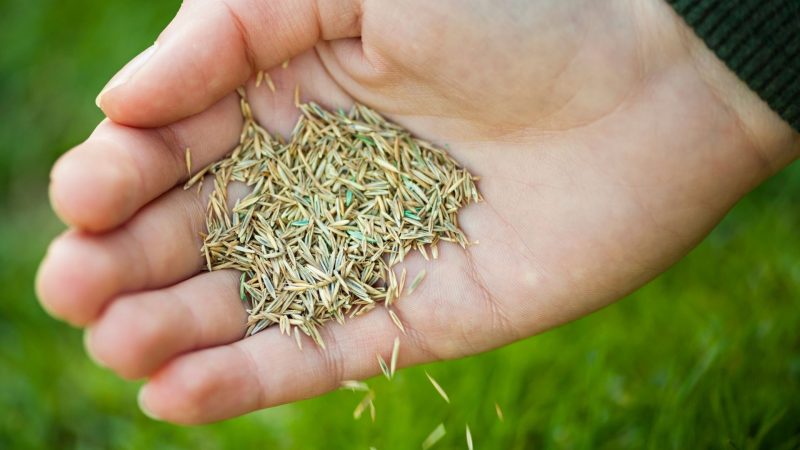
Unfortunately, you can no longer revive a dead seed because its endosperm is no longer supporting embryonic growth. A biologically dead seed cannot be reversed to a viable seed. Conversely, a fresh ungerminated seed, also known as a dormant seed, is very likely to overcome dormancy if treated properly.
How to Check if Grass Seed Is Okay?
Grass seed is okay if it is viable or can still germinate. Cutting a grass seed in half and checking its appearance is not a reliable method because a dormant seed and a dead seed sometimes look similar. Therefore, the ideal way to check the condition of grass seed is to test its viability, especially the old ones.
One of the easiest methods to test seed viability is the so-called water test. Here, the grass seeds are placed in a container with water for about 15 minutes. If the seeds sink, they are still likely to germinate. But if they float, chances are they will no longer sprout. However, this test is also unreliable.
Therefore, the best way to check seed viability is through germination tests. This includes topographical tetrazolium test, embryo excision test, radiography (X-ray), and using Hydrogen peroxide. However, most of them need expertise and equipment. Therefore, here are simple steps on how to do a germination test:
Step 1: Slightly wet a piece of paper towel with water.
Step 2: Get 10 grass seeds from the packet and place them evenly on the paper towel.
Step 3: Roll the paper towel just enough so that the seeds will be moist but will not lack oxygen.
Step 4: Place the towel inside a sealed zip-up plastic bag. Alternatively, you can put the towel on a plate and wrap it very tightly with plastic wrap.
Step 5: Place the bag or plate in a warm environment, such as the kitchen counter or on top of the refrigerator. Placing it under direct sunlight can cause seeds to overheat.
Step 6: Check the seeds at least once a day to know they are starting to germinate. Add some water if necessary.
Step 7: Check if the seeds will grow between 7 and 10 days. If possible, know the estimated germination time of the species of your seeds.
Step 8: Calculate the germination rate, which is the percentage of the number of seeds that germinated over the number of seeds tested. For example, if 8 out of the 10 seeds will grow, the germination rate is 80%.
Note: If the germination rate is below 50 percent, your seeds are unlikely to grow. The higher the germination rate, the better chances your seeds will germinate.
Factors That Affect Grass Seed Germination During Storage
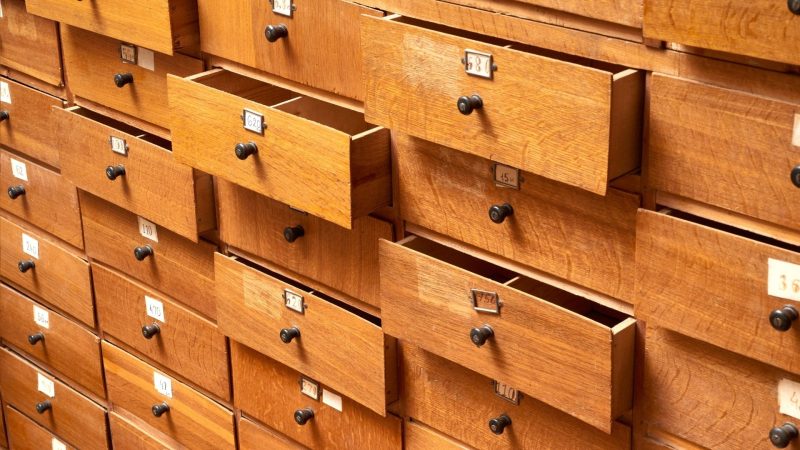
As mentioned earlier, expired seeds may still grow no matter how old they are. Instead, the growth condition depends on various factors during storage. Here are the most important ones:
1. Grass Species
Not all seeds are created equal and different species have different storage requirements from the others. For example, annual ryegrass and Chewings fescue have similar chemical composition, but the former has better storability than the latter. Grass seeds also store better than corn seeds and other oily seeds.
2. Moisture Content
Ideally, seeds with moisture levels below 13% are considered safe for long-term storage. Therefore, seeds with a higher moisture level should not be stored for a long time. Otherwise, they will soon become dry and will eventually die. The best location with a low moisture level is in your house, where you can also monitor it closely.
3. Temperature and Relative Humidity
Choosing the right temperature and relative humidity (RH) of the storage location is crucial when storing seeds. The temperature will manipulate the moisture content, which will determine the relative humidity. Most grass seeds are safe for storage with a temperature of below 60°F (15.5°C) and an RH of below 60%.
Ideally, grass seeds should be in a cool, dry place with a temperature of 40 – 50°F (4.4 – 10°C). Nevertheless, their germination rate will be reduced if they are stored at freezing temperature for a very long time. Young warm-season grasses are more likely to die in the winter as compared to young cool-season grass species.
Tip: For accurate measurements, place a thermometer and hygrometer inside your storage room.
4. Storage Time
Grass seeds that are stored in cool, dry locations have a higher germination rate if they have longer storage time. The length of storage time does not depend on the age of the seeds. Instead, it depends on the factors mentioned above and the health condition of individual grass seeds inside the same packet.
5. Store Sanitation
The life of the seeds also depends on their susceptibility to pests, such as insects and rodents, fungi, and other toxic substances that will damage the cells of the seed. Aside from maintaining temperature and relative humidity, your storage area should also be properly cleaned and sanitized regularly.
6. Initial Viability
The initial viability of seeds depends on the environmental conditions during seed maturation. Therefore, seeds with a high initial viability rate are very likely to have higher quality. However, note that viable seeds do not necessarily mean that they also have a high germination rate since some can be dormant seeds.
Can Grass Seed Freeze?
Grass seeds can freeze, and most frozen seeds still survive. If you plant grass seeds in the winter, it is called dormant seeding. The seeds will stay dormant and will grow once the weather starts to get warm. The roots of young seedlings can die within a few days due to freezing temperatures.
Here is a video about dormant seeding in the winter:
Can Old Seeds Germinate?
Old seeds can still germinate, just like the young ones. In fact, even a thousand years old seeds will still grow as long as they pass the germination test. However, the older the seeds are, the less energy they have. But before planting old seeds, they should first undergo some special treatments such as scarification.
Why Do Some Old Seeds Not Germinate?
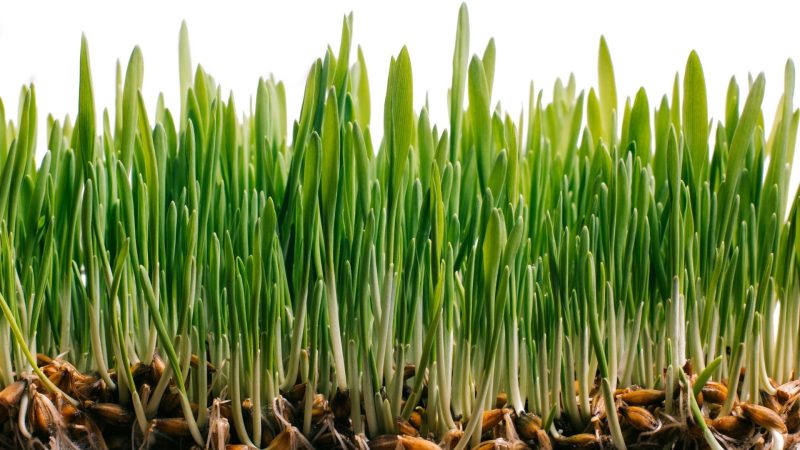
Some old seeds may still germinate, while some may not. The old seeds that will no longer germinate are the dead ones, along with some of the dormant seeds. Seed dormancy means that their shells turn hard and cannot receive water. Nonetheless, they can still have a chance of having a high germination rate.
Do Old Seeds Grow Slower?
Old seeds don’t grow slower simply because the age of seeds is not a contributing factor to their growth speed. As a matter of fact, old seeds can still grow as fast as the younger ones, and they can still produce healthy plants. Even so, they will have a lower germination rate, and some of them may no longer sprout.
How Long Do Seeds Take To Sprout?
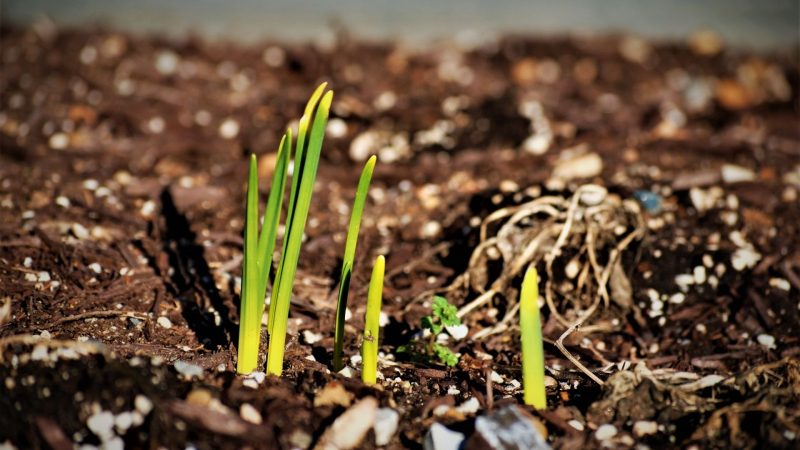
Most grass seeds usually take 5 – 10 days to sprout if given optimal conditions. Meanwhile, some vegetable seeds may take 1 – 3 weeks to sprout after sowing. In general, seed germination depends on the type of seed, moisture of the soil, temperature, and humidity. The age of the seed does not affect plant growth.
How to Store Grass Seed? | Useful Tips
As a general rule, you should not buy grass seeds if you will not plant them right away. If you fail to plant them immediately, you can still plant them later as long as you store them properly. Below are useful tips on how to store leftover or unused grass seeds so they can stay viable for a long time:
- Make sure that the seeds are clean and dry.
- Place the seeds in air-tight containers. If the seeds are still in the original pack, place the pack inside the container.
- To maintain dryness, include some as dry charcoal, dry wood ash, or small pieces of newspaper. The moisture-absorbing material must consume about one-fourth of the space.
- Put a proper label, which includes the seed type and the date when you stored them. If possible, also record the date of the germination test.
- To protect the seeds from fungi and insects, put some neem leaves, powdered black pepper seeds, neem or peanut extract, or naphthalene balls.
- Store the seeds in a cool, dry place. The temperature should be 40 – 50°F, and relative humidity should be below 60%.
Summary
Successful grass seed germination starts with proper storage of the seeds. Expired seeds can still grow, but this should not be an excuse for planting seeds late. Don’t be in a hurry to buy seeds if you are not yet sure that you can plant them at once. This is also why you should know the right seeds that will grow on your lawn.
Related: How Long Does It Take Grass Seed to Grow? | Information and Facts!